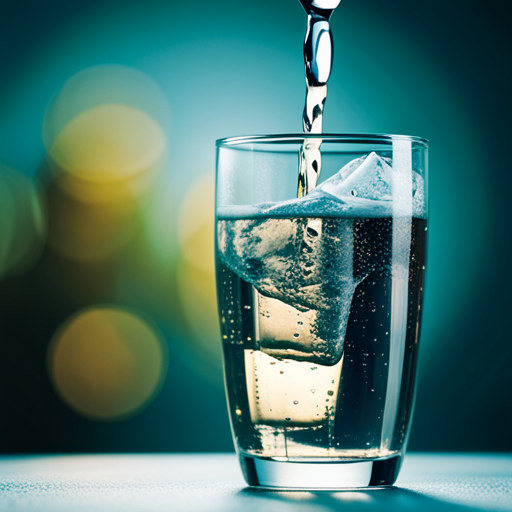Are you tired of dealing with limescale buildup and reduced soap efficiency? Hard water can be a real nuisance in your daily life, affecting everything from your appliances to your skin and hair health. But fear not, because water softeners are a popular solution for combatting the negative effects of hard water.
In this article, we’ll explore the pros and cons of water softeners, as well as alternative solutions to help you make an informed decision about the best water treatment solution for your specific needs and budget. While water softeners can provide numerous benefits, such as extending appliance lifespan and improving skin and hair health, they also come with some drawbacks, such as requiring salt top-ups and stripping water of beneficial minerals.
So let’s dive into the world of water softening and discover the best solution for you.
Key Takeaways
– Water softeners combat limescale and enhance soap performance, but require salt top-ups and may not suit low-sodium diets.
– Soft water lacks essential minerals found in hard water and may have a slightly salty taste, but contributes to healthier, more vibrant skin and hair.
– Water softeners provide soft water and remove low levels of iron, extending appliance lifespan and preventing plumbing damage, but strip water of beneficial minerals and have a high upfront cost.
– Alternatives to water softeners include water conditioners, descalers, and reverse osmosis filters, each with their own unique benefits and drawbacks.
What is hard water?
Before you decide whether a water softener is right for you, it’s important to understand what hard water is and how it can affect your daily life.
Hard water is characterized by high levels of minerals, primarily calcium and magnesium, which can cause limescale buildup and reduce the effectiveness of soaps and detergents. This mineral buildup can also damage appliances and plumbing, leading to costly repairs and replacements.
Fortunately, there are treatments available for hard water. Water softeners are one option, which use salt to remove minerals from the water and prevent limescale buildup. However, there are also alternatives such as water conditioners and descalers that alter the structure of minerals in the water or use electronic or magnetic forces to prevent buildup.
It’s important to weigh the pros and cons of each option and consider your specific needs and budget before making a decision.
Benefits of water softeners
You can enjoy soft, limescale-free water that’s gentle on your skin and hair, while also extending the lifespan of your appliances and preventing plumbing damage by using a water softener.
Here are some benefits you can expect from using a water softener:
– Soft water reduces the amount of soap and detergent needed for cleaning, saving you money and reducing the amount of chemicals released into the environment.
– Soft water also helps your appliances last longer by preventing limescale buildup that can damage them over time.
– Additionally, soft water is gentler on your skin and hair, leaving them feeling smoother and more hydrated than hard water.
While the water softening process can have some impact on the environment, it’s generally considered to be small. The salt used in the process can contribute to salinity in groundwater and can also harm plants and wildlife if not properly disposed of. However, most water softeners use only a small amount of salt and have options for disposing of it safely.
Overall, the benefits of using a water softener generally outweigh any potential negative impacts on the environment.
Drawbacks and alternatives
If looking for a solution to combat hard water, it’s important to consider the drawbacks and explore alternative options. While water softeners offer many benefits, they also have a few drawbacks that might make them unsuitable for some households.
One of the biggest concerns is sodium intake. Water softeners require regular salt top-ups, which means the softened water has a higher sodium content. This can be a problem for individuals on low-sodium diets or those with health conditions that require them to limit their sodium intake.
Fortunately, there are alternatives to water softeners that can address hard water issues without adding sodium to the water supply. Electronic descalers, for example, use magnetic or electronic fields to change the mineral structure of hard water, preventing limescale buildup without removing beneficial minerals. These systems are typically less expensive than water softeners and require little maintenance. However, they may not be as effective as water softeners in preventing limescale buildup, and some users report mixed results.
Ultimately, it’s important to carefully weigh the pros and cons of each option and choose the solution that best fits your specific needs and preferences.
Conclusion
So, is water softening the right choice for you? It really depends on your specific situation. If you’re dealing with significant limescale buildup, reduced soap efficiency, and frequent appliance repairs, then a water softener could be a game-changer for you.
However, if you’re concerned about the environmental impact of salt-based softeners or the potential health risks of drinking demineralized water, then you may want to consider some of the alternatives we discussed, such as salt-free softeners or reverse osmosis systems.
Ultimately, the decision to invest in a water softener or alternative water treatment solution should be based on your personal preferences, budget, and water quality needs.
By weighing the pros and cons and exploring all available options, you can make an informed decision that’ll help you enjoy the benefits of clean, clear, and healthy water for years to come.




